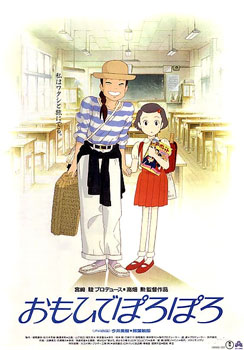
Reviews: RottenTomatoes (100%), IMDB (7.7), Wikipedia, Amazon.
Similar movies: anime, joyful, romance.
Summary: A lovely movie: calm and gentle like a steady stream. With comedy, nostalgia and romance packaged together into a wonderful work of art.
The story revolves around a 27-year old girl Taeko. She starts remembering her childhood, when she was nine or ten. There is no 'cat bus', no mythical creatures, no fantasy. It's real and simple. In fact, the beauty of the movie lies in its simplicity. It reminds me of movies like 'An Autumn Afternoon' by Yasujiro Ozu.
Details: Taeko is an unmarried city girl with a busy but boring life. She makes a trip to the countryside. During the trip, she starts remembering seemingly mundane events from her childhood: how she was picky and didn't like certain foods, how she had quarrels with her sisters over bags and clothes, how she was awed by big bathhouses, what happened when girls of her age started getting their periods, how her dad didn't let her participate in drama because it wasn't perceived as a good line of work, how her dad slapped her the only time in her life, how she developed feelings for a boy for the first time, how she had a difficult time understanding division of a fraction by another fraction, how she continued to feel guilty at being unkind and rejectful towards a boy who sat next to her for several months, and so on.
Scenes of the past are interleaved with scenes from the present. During her trip to the countryside, Taeko develops a friendship with Toshio, a joyful farmer who loves nature and organic farming. Slowly, Taeko realizes that her friendship is actually a deep connection because her conversations with Toshio evoke memories from the past, which help her understand herself better. Their connection is sublime. No hugs or kisses.
The movie interleaves the present and the past very well. The transitions are smooth and poetic. The interleaving increases as the movie progresses, culminating in a beautiful end sequence. As Taeko departs from the countryside in a train, she starts wondering whether her happiness lies in a career in the big city or with Toshio in the countryside. "Love knows not its own depth until the hour of separation", as Gibran says. If I close my eyes and imagine, "could I have made the end sequence any better?" Not at all. "Could I have even conceived of it?" No. The end sequence is a gem.
All in all, the movie narrates a story of self realization - what makes us truly happy? And it reminds me of creeks and forests. The most endearing conversations that I remember from my hikes centered around memories from childhood
Good review — Another good review.
Watch online: Part I — Part II — Part III — Other choices.
The closing sequence plays the song Ai wa hana, kimi wa sono tane by Miyako Harumi. The song is a Japanese version of "The Rose" by Amanda McBroom:
THE ROSE by Amanda McBroomSome say love, it is a river that drowns the tender reed.
Some say love, it is a razor that leaves your soul to bleed.
Some say love, it is a hunger, an endless aching need.
I say love, it is a flower, and you its only seed.
It's the heart, afraid of breaking, that never learns to dance.
It's the dream, afraid of waking, that never takes a chance.
It's the one who won't be taken, who cannot seem to give.
And the soul, afraid of dyin', that never learns to live.
When the night has been too lonely, and the road has been too long,
And you think that love is only for the lucky and the strong,
Just remember in the winter far beneath the bitter snows,
Lies the seed, that with the sun's love, in the spring becomes The Rose.
Somehow, I feel that the Western style of singing doesn't do justice to these lyrics. My ears are attuned to warmth and gentleness of Indian classical singers like Lata Mangeshkar, S P Balasubramaniam and Hari Haran. Anyhow, the best version on YouTube that I could discover is by Amanda McBroom herself.

